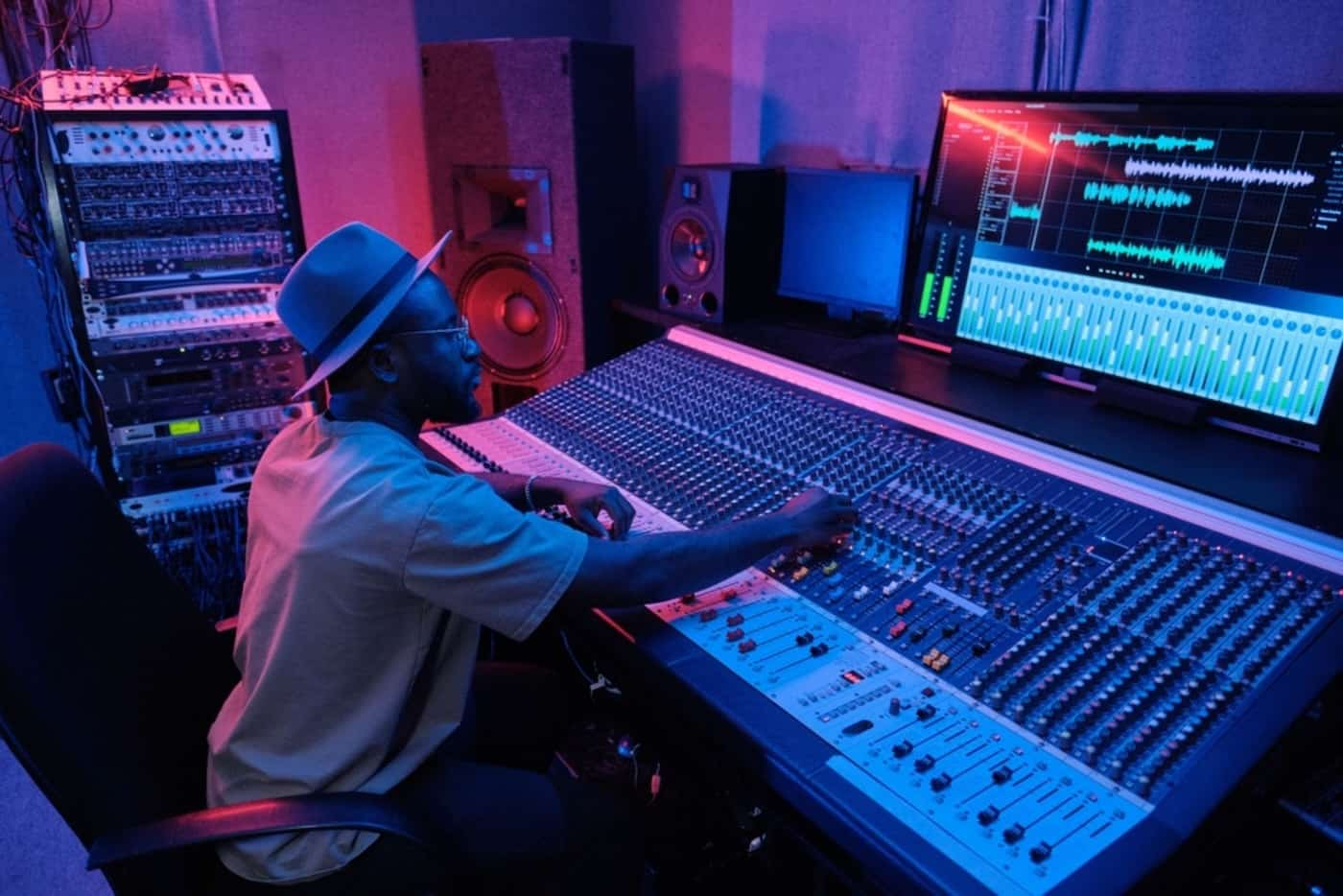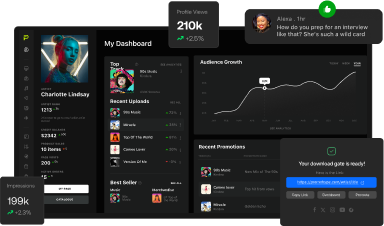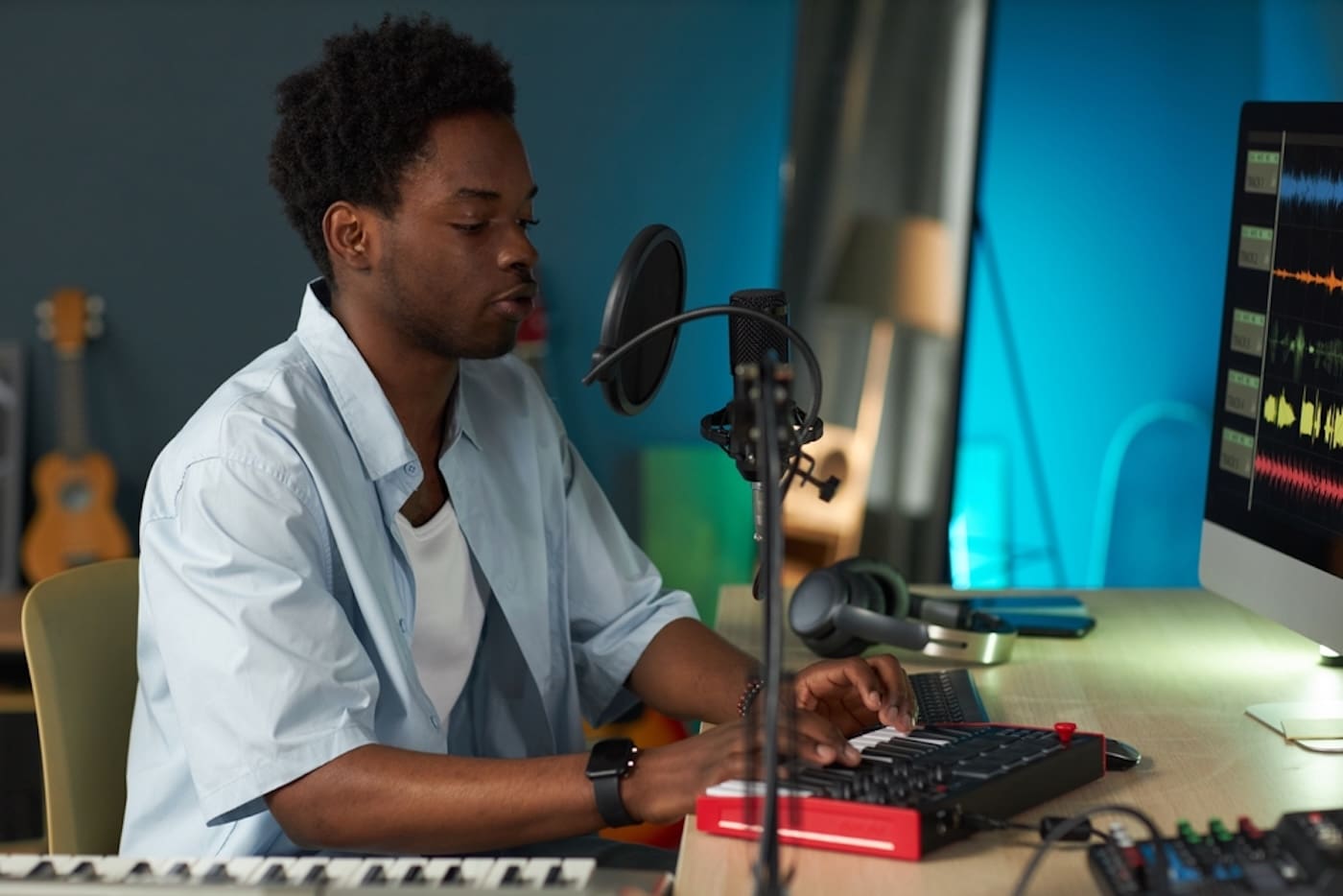
Behind the scenes, the best music producers develop the sounds that make some music unforgettable. They transform ideas into timeless classics that last for decades, setting trends and leaving their mark on popular culture.
In our rundown of the 10 best music producers of all time, we look at their signature styles, contributions to the music industry, and the impact they have had on music throughout history.
So without further ado, let’s dive into the list!
Get Early Access
To Promo Hype
The 10 Best Music Producers of All Time (Ranked 2025)
These legendary producers didn’t just craft the classic hits we know and love; they defined the sound of entire generations.
From sonic innovators to studio masterminds, these are the 10 best music producers of all time, whose influence still echoes across every genre today.
10. Nile Rodgers
Nile Rodgers helped bring disco to the world, and as one of the minds behind the band Chic, he created a sound that moved bodies and transcended genres. Classic songs like “Le Freak” and “Good Times” set the tone for disco, becoming a sample library for early hip-hop. Nile didn’t stop at Chic, he has worked with artists beyond the dance floor and brought his signature guitar sound to new generations.
Working with some of the biggest names in the industry, he helped David Bowie find a new audience with Let’s Dance and produced Madonna’s iconic album, Like a Virgin. Rodgers ‘ production spans decades, and his music has been sampled by everyone from The Sugarhill Gang to A Tribe Called Quest.
Later, Daft Punk’s Get Lucky brought his sound to a new era and earned him a Grammy. He’s a Rock and Roll Hall of Fame inductee and co-founder of the We Are Family Foundation. He still performs with Chic and continues to produce, proving his creativity and relevance are far from over.
9. Max Martin
Max Martin is a Swedish producer and one of the biggest names in pop, yet the chances are, you’ve never heard of him. Writing and producing for artists ranging from Britney Spears to Justin Bieber, and dozens more in between, he’s been behind some of the biggest pop songs of the past 30 years.
Martin’s work dates back to the late 1990s, when he collaborated with artists such as the Backstreet Boys, NSYNC, and Kelly Clarkson. His approach blends strong melodies with polished structure and emotion that feels effortless.
He continues to adapt with the times and now works with some of the most prominent artists of the day, including The Weeknd, Taylor Swift, and Ariana Grande. His pop hits often strike a balance between emotionally charged lyrics and beats that stay stuck in your head. The artists may change, but the results remain the same: chart-topping songs and plenty of awards. Despite staying out of the spotlight, Martin’s influence on pop music is evident everywhere.
Promote your music with Promo Hype.
8. Phil Spector
Phil Spector is regarded as one of the most successful producers of the 1960s. He developed his famous Wall of Sound, a production technique characterised by the dense layering of instruments. This created a lush, textured sound that relied on specific pieces of music production equipment, such as the unique acoustics of the studio, large ensembles, and echo chambers.
One iconic collaboration was with The Ronettes, who were fronted by his then-wife Ronnie Spector. Their 1963 hit Be My Baby demonstrated Spector’s trademark blend of layered orchestral arrangements. Spector’s work with The Righteous Brothers culminated in their 1964 ballad, You’ve Lost That Lovin’ Feelin’. It became the most-played song on American radio and is a perfect example of his signature sound.
Spector would go on to work with many big names, including The Beatles, where he turned their abandoned Let It Be project into a fully fledged album. Despite his troubled personal life and eventual downfall, his impact on music is undeniable.
Many top producers have named Spector and his techniques as inspiration. He reshaped how songs could feel bigger, fuller, and almost overwhelming at times. He was truly a visionary producer, and he could see no reason why a three-minute track couldn’t sound like an opera.
7. Timbaland
Timbaland shook up hip-hop production and R&B with beats in a way that no one saw coming. He used offbeat rhythms, unusual samples, and sounds that were unidentifiable yet irresistible. His style was to combine samples with live instruments to create something that was both gritty and smooth, yet undeniably cool.
Then, along came Justin Timberlake, and Timbaland helped him transition from a boy band member to a solo star. Albums like FutureSex/LoveSounds had a distinctive sound that was typically Timbaland. His beats don’t follow the usual structures as they zig where others zag. His use of space, strange percussive elements, and chopped vocals gave the songs structure and texture, making every track feel as though it’s in motion.
Timbaland is also known for reinventing artists. He worked with Nelly Furtado to completely transform her signature sound, and rock bands like OneRepublic received his magic touch. He has had numerous chart-topping hits with acts such as Michael Jackson, Jay-Z, Beyoncé, Madonna, Kanye West, Rihanna, Alicia Keys, Lil Wayne, and Björk.
Timbaland is more of a sonic designer than a producer, and he has stayed relevant by pushing boundaries. Others may get stuck repeating themselves, but Timbaland reinvents the rules. More than 30 years into the music business, Timbaland continues to surprise listeners.
6. Dr. Dre
Dr. Dre helped to define the sound of West Coast rap while a member of N.W.A. Following Ice Cube’s departure from the group, Dre produced much of their second album, Efil4zaggin. He also produced tracks for several other acts on Ruthless Records, including Eazy-E’s 1988 solo debut album Eazy-Duz-It.
After leaving N.W.A., Dre released his debut album, The Chronic, where he fine-tuned G-funk, mixing Parliament-style funk with slow, deep basslines and crisp snares. His label, Aftermath Entertainment, became a launchpad for some of hip hop’s biggest names, including Snoop Dogg, Eminem, 50 Cent, and Kendrick Lamar. Dre is known for using live instrumentation alongside innovative sampling, all with meticulous attention to detail.
Dre has left his legacy on the charts and has influenced how producers approach modern hip-hop today, making him one of the greatest hip-hop producers of all time.
Get Early Access
To Promo Hype
5. Quincy Jones
Few producers get to have the kind of career that Quincy Jones had. He was one of the most renowned names in music production, beginning his career as a jazz arranger before seamlessly transitioning into pop, R&B, and soul. He has worked with legends across the decades, including Frank Sinatra, Count Basie, Ray Charles, Aretha Franklin, and Celine Dion.
Most notably, Jones produced the albums Off the Wall, Thriller, and Bad, transforming Michael Jackson into one of the music world’s biggest recording artists. The albums combined disco, rock, funk, and soul in a way that felt completely natural.
Jones was not afraid of complexity, though his music never felt crowded. He found balance in everything and proved you don’t need a big studio to make big music. Over a seven-decade career, he received 75 Grammy nominations and won 28 times. And yet, he remained curious, and even when he was well into his 80s, Jones continued to champion new talent and push boundaries.
4. Brian Eno
Brian Eno has a true artist’s vision when it comes to his work as a music producer. He is as much about mood and emotion as he is about melody and rhythm. Eno’s approach involves creating atmospheric soundscapes through his electronic music production. He’s fascinated by randomness, texture, and how music interacts with space, and his album Music for Airports helped to launch ambient music as a genre.
He became one of the most sought-after producers after producing David Bowie’s Berlin Trilogy, which comprises the albums Low, Heroes, and Lodger. In the mid-80s, he began his long-running collaboration with U2, producing six of their studio albums. He treated the studio like a canvas and built a cinematic feel, most notably in their albums The Joshua Tree and Achtung Baby.
Eno doesn’t care about hits; instead, he helps artists grow, think, and sometimes completely abandon their initial vision. He has collaborated with a diverse range of artists, including Talking Heads, Coldplay, and James Blake. Beyond his music production work, he has developed music production software, devised apps, and music that blends technology with creativity.
Learn more about a Promo Hype membership.
3. Joe Meek
Joe Meek was a pioneer, a rebel, and a genius ahead of his time. Working from his home production studio, a flat above a shop on Holloway Road in London, he turned it into a creative playground. With little more than reel-to-reel tape and homemade music production equipment, Meek crafted otherworldly sounds.
His most significant commercial success was Telstar by The Tornados in 1962, which was the first UK single to top the US charts. The space-age instrumental changed what a pop record could be. Meek was one of the first to use close miking on drums, manipulate tape speeds, and apply layered effects with remarkable precision.
His influence would stretch far beyond the 1960s. Punk rock, electronic music, and lo-fi pop all owe something to Meek’s DIY ethic. His contribution to the music industry can’t be overstated, and Meek proved you could create something revolutionary with what you had to hand.
2. George Martin
George Martin made his name producing one of the most successful bands in music history, The Beatles. He was the man who translated their wildest ideas into sound. When John Lennon wanted to sound like he was hanging from a ceiling fan or Paul McCartney dreamed of a circus on acid, Martin found the sounds.
It was his classical training that provided him with the tools to transform the band’s beautiful, dark, twisted fantasies into something tangible. He arranged strings, suggested edits, and reinvented what a studio could be and do.
From The Beatles’ White Album to Sgt. Pepper and back again, his influence was everywhere. He treated each album like a new challenge, constantly experimenting with tape loops, backward recordings, melodic elements, and unusual instrumentation. Under his guidance, The Beatles moved from lovable pop stars from Liverpool to fearless innovators.
Martin’s influence didn’t end with The Beatles; he produced for artists such as America, Jeff Beck, and Celine Dion. He also composed film scores and built studios, most famously AIR Studios in London and Montserrat. Without him, the Beatles might have been great, but with him, they became revolutionary.
1. Rick Rubin
Rick Rubin strips music down to its bare bones, removing the polish, the pressure, and the pretense, so artists can find what truly matters. He began his career in hip-hop, co-founding Def Jam and producing early records by Run-DMC and the Beastie Boys. Rubin then jumped through some of the most popular music genres from rap to heavy metal, rock music to country, gospel to alternative rock.
His production credits are vast and include six of the Red Hot Chili Peppers’ albums, as well as those of Rage Against the Machine, Keesha, Lady Gaga, and Ed Sheeran. He was also responsible for Johnny Cash’s career comeback. He helped System of a Down sound both brutal and thoughtful, and coaxed intimate performances out of Adele and Linkin Park, while helping Kanye West craft bold, sprawling albums.
Rubin is known for his minimalism. Often barefoot in the studio, he listens deeply, sometimes even meditating with an artist or instructing them to record in silence. His credits span decades, but he remains curious, open, and focused on feeling. Rubin changed the music industry quietly, profoundly, and forever, making him a top producer on our list of the best music producers of all time.
Summary
The best music producers of all time have shaped the sound of modern music with their signature styles and groundbreaking innovation. From defining genres to launching iconic artists, their influence reaches far beyond the studio, setting the gold standard for music production and inspiring generations of musicians to come.
Get Early Access
To Promo Hype
Join Promo Hype






